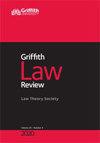Regulating disinformation on Twitter and Facebook
IF 0.9
Q1 LAW
引用次数: 1
Abstract
ABSTRACT The spread of disinformation in recent years has caused the international community concerns, particularly around its impact on electoral and public health outcomes. When one considers how disinformation can be contained, one often looks to new laws imposing more accountability on prominent social media platforms. While this narrative may be consistent with the fact that the problem of disinformation is exacerbated on social media platforms, it obscures the fact that individual users hold more power than is acknowledged and that shaping user norms should be accorded high priority in the fight against disinformation. In this article, I examine selected legislation implemented to regulate the spread of disinformation online. I also scrutinise two selected social media platforms – Twitter and Facebook – to anchor my discussion. In doing so, I consider what these platforms have done to self and co-regulate. Thereafter, I consider the limitations on regulation posed by certain behavioural norms of users. I argue that shaping user norms lie at the heart of the regulatory approaches discussed and is pivotal to regulating disinformation effectively.监管Twitter和Facebook上的虚假信息
摘要近年来,虚假信息的传播引起了国际社会的关注,尤其是其对选举和公共卫生结果的影响。当人们考虑如何遏制虚假信息时,人们通常会看到新的法律对知名社交媒体平台施加更多的问责。虽然这种说法可能与社交媒体平台上虚假信息问题加剧的事实一致,但它掩盖了一个事实,即个人用户拥有的权力超过了公认的权力,在打击虚假信息的斗争中,塑造用户规范应被高度优先。在这篇文章中,我研究了为规范网上虚假信息传播而实施的一些立法。我还仔细检查了两个选定的社交媒体平台——推特和脸书——来锚定我的讨论。在这样做的过程中,我考虑到这些平台在自我监管和共同监管方面做了什么。此后,我考虑了用户的某些行为规范对监管的限制。我认为,塑造用户规范是所讨论的监管方法的核心,也是有效监管虚假信息的关键。
本文章由计算机程序翻译,如有差异,请以英文原文为准。
求助全文
约1分钟内获得全文
求助全文

 求助内容:
求助内容: 应助结果提醒方式:
应助结果提醒方式:


